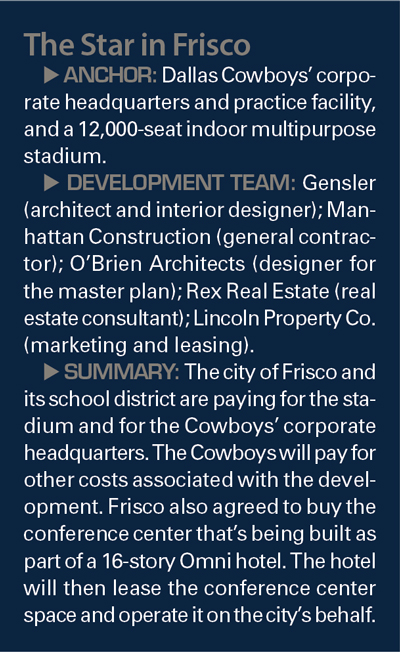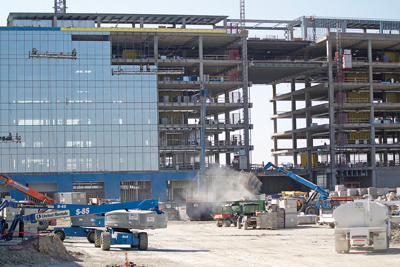The Dallas Cowboys’ new headquarters and practice facility, high-profile anchors for a mixed-use development in north Texas, expands the team’s real estate interests to greater heights and creates a new model in the NFL for turning a team’s internal operations into a major attraction.
The Ford Center at The Star, the official name of the complex, is part of a 91-acre development in Frisco, one of the country’s fastest-growing communities. In a cutting-edge deal, the Cowboys teamed with the city of Frisco and its independent school district to build a 12,000-seat indoor stadium, two six-story office towers, and 150,000 square feet of specialty retail and restaurant space. The stadium and office towers, of which the Cowboys will take up 75,000 square feet of space and lease the remaining 325,000 square feet, open in August 2016. Some of the retail outlets open later next year.
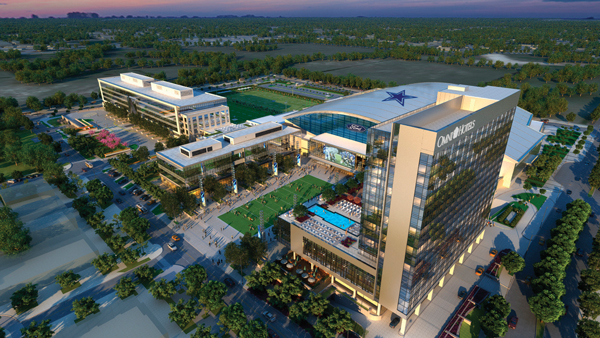 |
The Star will be the headquarters and practice facility of the Dallas Cowboys and will contain an indoor stadium that will be home to high school football games.
Photo by: Dallas Cowboys |
Separately, the Cowboys partnered with Omni Hotels to build a 300-room property at Ford Center that opens in 2017. The Cowboys plan to market the overall complex as a year-round destination for fans, tourists and corporations.
As part of their business plan, the Cowboys will extend the robust business they do on non-game days at AT&T Stadium to multiday conferences at their new headquarters. In Frisco, for example, companies could run presentations in the same theater room Cowboys head coach Jason Garrett uses for team meetings. They could conduct a sales rally tied to a flag football game on the stadium’s field, and cap it off with a group dinner at the Cowboys Club, the team’s private membership restaurant.
“This idea of a two- to three-day corporate retreat where we can create a unique experience here is a business we’re going to attack,” said Chad Estis, the Cowboys’ executive vice president of business operations.
For the Jones family, owners of the Cowboys and Blue Star Development, the family’s real estate company, the Frisco project marks new territory by extending its reach into hotel ownership and management of the upscale Cowboys Club, which will overlook the team’s two outdoor practice fields.
The Cowboys also are getting into the business of running health clubs. Cowboy Fit, a fitness club attached to the
stadium, is a partnership with Mark Mastrov, co-owner of the Sacramento Kings and owner of the 24 Hour Fitness chain.
The stadium, hotel and office towers take up 26 acres — about one quarter of the site. The project sits about 30 miles northeast of Valley Ranch, the team’s current headquarters and practice facility in Irving. The city and school district paid $90 million upfront to fund stadium construction plus $25 million to build the Cowboys’ headquarters.
The deal calls for the city to own the stadium, the two practice fields and a 1,500-space underground parking garage. The Cowboys pay for the balance of project costs and own the rights to book the stadium and retain a majority of its revenue.
The city and the school district own certain rights to stadium signs and events for themselves, including Frisco high school teams playing football and soccer games in a building that will feature cushioned seats, video boards, four suites and other amenities on par with NFL and MLS venues.
“The big story is you have a pro team partnering with a school district,” said Byron Chambers, sports practice area leader for Gensler, the architect designing the stadium, hotel and the Cowboys’ headquarters. “Nobody else is doing that. The Cowboys, like they always are, went out and did something first.”
Finding a home in Frisco
The vision for developing Ford Center, which potentially could blossom into a $2 billion development along the 91-acre site, started with Frisco’s need to build two new football stadiums. The school district is expected to grow from its current eight high schools to a dozen or more over the next several years.
Frisco already had $30 million in bond money approved for construction before the city approached Blue Star in 2013 about teaming up for a much bigger project along a stretch of land called the “$5 Billion Mile,” a reflection of the explosion of development in Frisco, a city of about 140,000. Stonebriar Centre, one of the biggest malls in north Texas, is a stone’s throw away from Ford Center. Also nearby is Frisco Station, a $1 billion mixed-use project in development that will have office space, residential units, retail and entertainment.
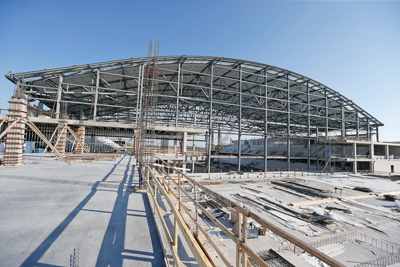 |
The stadium (top) and office space will be finished next year.
Photo by: James D. Smith (2) |
On their own, the Cowboys had searched for potential sites to build a new headquarters, including Arlington, where AT&T Stadium opened in 2009. In that city, though, they saw the failure of Glorypark Town Center, Tom Hicks’ proposed mixed-use project between Globe Life Park, the Texas Rangers’ ballpark and the Cowboys’ facility.
Hicks, who owned the Rangers at the time, couldn’t get financing for the multibillion-dollar development during the Great Recession, and it never broke ground.
Eight years later, the Cowboys believe Frisco has much greater potential, according to Stephen Jones, the team’s chief operating officer, executive vice president and director of player personnel.
“We watched [Glorypark] very carefully,” Jones said. “It’s just not the blue-chip quality real estate that Frisco is in terms of where the growth patterns are right now.”
Two years ago, after Frisco officials came calling with an offer the team couldn’t refuse, the Cowboys committed to moving to a city that’s already home to Toyota Stadium (home of FC Dallas), the Dallas Stars’ practice facility and a minor league ballpark. The mixed-use piece gave the Cowboys the motivation to forge ahead with building their new headquarters in Frisco. They also embraced the grassroots aspect of teaming with the school district, Jones said.
“Frisco had a bunch of money pigeonholed to build a stadium,” he said. “They said, ‘Either we can build it or you can build it and make it part of our complex and we’ll give you the money we had earmarked for it.’ They gave us public money for our headquarters like they did for a lot of other companies that move into Frisco. It’s not unlike AT&T Stadium — it kept growing [in scope] once we saw the vision of what it could be and how special it could be.”
Sponsors sign up
The beauty of Ford Center is the Cowboys have additional resources to market the project through Legends, the 7-year-old sales, food and retail, and facility development company they co-own with the New York Yankees.
Legends sunk its teeth into Frisco by executing the same business strategies it uses for developing major league and college venues in other markets. Its role for Ford Center started with evaluating sponsorship opportunities for the complex. The Cowboys’ sales staff then took over for selling the sponsorships.
In September, Ford Motor Co. signed naming rights for the property itself, including the practice facility, a 10-year
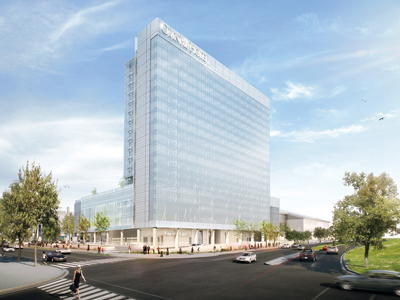 |
A 300-room Omni Hotel is part of the project.
Photo by: Dallas Cowboys |
deal valued in the seven figures annually. At the same time, Lincoln Motor Co., a Ford division, signed a separate deal with the Cowboys for a high-tech space in Ford Center’s retail portion to display its products. The details of that agreement are still being worked out but include permanent branding for Lincoln at the complex.
In addition to Ford and Lincoln, major sponsors include Dr Pepper, PepsiCo, the Texas Lottery, Whataburger and Panasonic. Ford, Dr Pepper and PepsiCo are also founding partners at AT&T Stadium.
Panasonic signed a five-year deal this year to replace Sony as a Cowboys sponsor in Arlington and its agreement at Ford Center covers audio-visual equipment for conference rooms and the installation of video boards inside and outside the stadium.
Two of those sponsors will brand the Ring of Honor recognizing Cowboy greats that will be on Main Street, the road running down the middle of the development, and the 40,000-square-foot plaza outside the stadium, although the Cowboys have not publicly identified those companies. The plaza, which will feature a turf field, will serve as the focal point of the complex, a public gathering space to be used for NFL draft parties, festivals, training camp functions and high school football pregame rituals.
The sponsorship sales program kicked off at the preview center on a suite level at A&T Stadium, which lays out the vision for Ford Center. The number 355, illuminated on a backlit sign, represents the major presence the Cowboys will have in Frisco outside of 10 games in Arlington.
In the room next door, Omni is building its own preview center that opens later this month. It will feature two mock hotel rooms to show companies interested in booking events at Ford Center a clearer picture of Omni’s first-class amenities.
For the Joneses, the Omni’s center was just one aspect of the high-end lodging business they have learned over the past year in their new role as a hotel developer.
“They usually try to lease space across the street from the site,” Jones said. “In this particular case, the office market is so hot up in Frisco they couldn’t get any space that made sense and fit their budget. So they asked us about putting it in the stadium.”
Welcome to the club
Apart from sponsorship, technology providers AT&T and Cisco are expected to play key roles for developing Ford Center’s wireless infrastructure and mobile networks, mirroring their work at AT&T Stadium.
“There will be interactive screens throughout the development and a [digital] billboard along the tollway,” Jones said.
Connectivity will be critical inside the Cowboys Club, where members will pay a $4,000 one-time fee, plus $350 monthly dues. Food and drink are a separate cost. The fees will cover access to an outdoor pool and a deck serving as an event space above the club, plus Cowboy Fit membership and meeting space.
The 20,000-square-foot club will seat 375 people. The Cowboys’ sales staff will sell 1,500 to 2,000 memberships starting this month. Season-ticket holders and sponsors get first crack at buying memberships, Estis said.
CSL International, Legends’ sister company, determined club pricing through surveys and focus groups. Bill Rhoda, CSL’s founder and president of Legends’ global planning division, is a Frisco resident.
Legends will run the Cowboys Club and stadium concessions, and handle sales of tours and catered events at Ford Center, similar to what it does at AT&T Stadium. In Arlington, stadium tours alone bring 400,000 visitors annually through the doors, producing $3.6 million in merchandise sales.
In August, Legends hired ex-Cowboys account representative Nick Kopach as Ford Center’s director of sales, and his focus is hitting small to midsize companies to use the Cowboys Club as a business tool. For Frisco as a whole, it provides a fine dining option on the weekends.
Dallas Cowboys Merchandising, the Cowboys’ in-house retail company, also gets a piece of the action in Frisco. It will open the third location for Fans United, a newer team store concept revolving around the sale of college and high school gear in addition to Cowboys apparel.
Fans United is separate from the Cowboys Pro Shop at AT&T Stadium run by Legends, said Bill Priakos, president
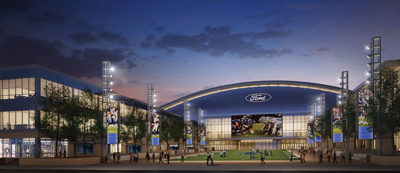 |
The plaza outside the stadium will feature a turf field and will serve as a gathering place for NFL draft parties, festivals and other functions.
Photo by: Dallas Cowboys |
of Dallas Cowboys Merchandising. At Ford Center, situated in a 10,000-square-foot store behind the south end zone, Fans United will sell Frisco high school merchandise, licensed apparel for the Cowboys, Rangers, Stars, Mavericks and FC Dallas, plus regional colleges including the University of Texas.
For the retail development down Main Street, Blue Star is in talks with popular Texas food brands to build a Tex-Mex restaurant, a high-end steakhouse and a seafood place. Whataburger and a few other fast-food eateries will be part of the mix to meet the needs of families attending high school events at the stadium. A Nike store will be among the apparel shops, Jones said.
Whether the partnership with a local school district becomes a model for other NFL teams to pursue as a mixed-use project remains to be seen. St. Louis Rams owner Stan Kroenke visited Frisco to get ideas for his proposed stadium development in Inglewood, Calif.
“He’s a land developer like ourselves, so he can get a good feel for what we’re doing in Frisco,” Jones said.
“Minnesota wants to come look. They’ve got some acreage for a new practice facility. Obviously, I think the appetite for high school football is like no other here in Texas, so I don’t know that you’d be able to do something like this in California or Missouri. Some people here will tell you they like going to high school football games better than college and pro. I do think once we’re up and running, people will be curious to see what we’ve done. The big key is the location.”



